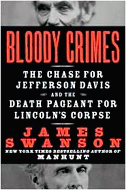|
Book review
‘They’re not dead…they live in memory,’
Swanson relates about Davis and Lincoln
Reviewed by
PAUL ROMINGER
Bugle Staff Writer
"Bloody Crimes: The Chase for Jefferson Davis and the Death Pageant for Lincoln's Corpse," by James Swanson; William Morrow press, an imprint of HarperCollins Publishers, 2010; 403 pages; bibliography, 23 pages; notes and index, 16 pages each; $27.99.
James Swanson has degrees in history from the University of Chicago and in law from UCLA. He has held several government and think tank positions in Washington, D.C., and serves on the advisory council of the Ford's Theatre Society. Readers will remember his previous saga, “Manhunt: The 12-Day Chase for Lincoln's Killer.”
The search for John Wilkes Booth was not the only journey taking place as the Civil War came to a close. Jefferson Davis was on the run, desperate to save his family, his country and his cause. Abraham Lincoln, recently assassinated, was on a different destination. He was bound for home, his grave and everlasting glory. The title of this book has three origins – a prophecy, a promise and an elegy. The first two words in the title are taken from Ezekiel 7:23, highlighted by John Brown in 1859: "Make a chain, for the land is full of bloody crimes, and the city is full of violence."
The Spring of 1865 was a remarkable season. It was a time to mourn the 620,000 killed in battle and to bind up the nation's wounds. It was a time to hunt for Jefferson Davis and to bury Abraham Lincoln. As Walt Whitman wrote, it was a time "when lilacs last in the door-yard bloom'd." The opening of this book draws you into this work and promises good reading. To be honest, at times when you find it necessary to put the book down, you will continue thinking about the story.
Confederate President Davis instructed his wife Varina to take their four children to Charlotte, N.C. "If I live, you can come to me when the struggle is ended." Mrs. Davis must have reacted with alarm to this. He responded, "I do not expect to survive the destruction of our constitutional liberty."
The flight of Jefferson Davis began in Richmond, Va., only to end 38 days later in Irwinville, Ga. The difficulties of this journey are interspersed with details of the relatively smooth procession of Lincoln's funeral train from Washington, D.C. to Springfield, Illinois. It is a compelling narrative, well researched and well told. You will believe again, ". . .they are not dead – they live in memory. . ."
|









